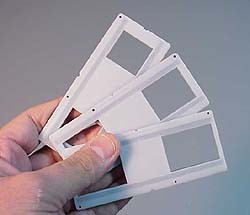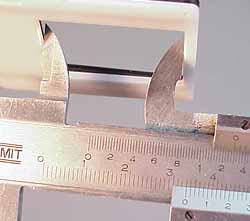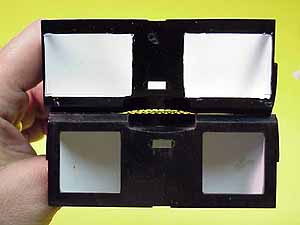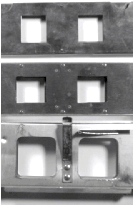Wide Stereo Viewing?
By
George A. Themelis
Original appeared (in modified form) in Stereogram 2.7
under the title “7 Sprockets and Beyond”
- Most stereo cameras made in the USA in the 1950s (Realist, Kodak, Revere, TDC, etc.) produce film chips which are 5 film sprockets wide (23mm unmasked or 21mm masked). This is known as the “Realist” or 5p format.
- Certain stereo cameras of European mainly origin (Belplasca, Busch Verascope, FED) produce film chips that were 7 film sprocket wide (30mm unmasked or 28mm masked). This is known as the “European” or 7p format. It is interesting to note that the Realist can be modified to take 7p images! I specialize in this service. See: www.RealistRepair.com/RBRepair.htm
- Most all 2D cameras today and certain stereo cameras (RBT) produce film chips that are 36mm wide, known as “Full Frame” or 8p format.
| Format name | Representative camera | No of Perforations | Full size (mm) | Masked size (mm) |
| Half-frame | Nimslo, Nishika... | 4p | 18 | 16 |
| Realist | Realist, Kodak... | 5p | 3 | 21 |
| European | Verascope, Belplasca, FED... | 7p | 30 | 28 |
| Full-frame | Almost any 35 mm (non stereo) camera & RBTs | 8p | 36 | 33 |
Mounting WIDE
Today stereo enthusiasts can use any camera and mount their slides in a variety of mounts. The most common stereo mounts are for 5p and 7p film chips but certain manufacturers (RBT, Spicer) make mounts for even wider film chips. RBT makes a mount with 33mm openings. This is the widest stereo mount and it is known as 8p mount.
 |
 |
RBT is one of the companies who make 101x41mm mounts, wider than Realist format. The record for the widest mount belongs to RBT with 33mm (shown at right). |
Viewing WIDE
All stereo slide viewers will show 5p (Realist size) while some viewers will show 7p without any modifications (but there is still a slight cutoff at the edges in most viewers). The viewers in this group include: Radex ($3.25 from Reel 3-D), Brumberger, TDC Deluxe, Revere, Wollensak. The Realist and Kodak viewers will not show the entire 7p but will block part of the image at the edges. (In the case of the Realist red button this cropping is asymmetric and it destroys a well-placed stereo window.) This can be a problem for people, like myself, who use a variety of stereo camera systems and mount slides in mounts wider than 5p.
That’s were my aperture widening service comes handy. I can widen the Realist red button to show the widest RBT mount or the Kodaslide and Realist green button to show 7p slides.
- Note that this modification does not affect viewing of 5p slides. You can view the 5p slides just as before, but you can also view 7p slides that you could not view before.
- Also, the slides must be mounted in standard 41x101mm stereo slide mounts. My viewer modification will not make the viewer capable of handling two separate full-frame mounts.
Users who wear glasses might not be able to view the entire frame area and there is some light fall-off towards the edges, but, overall, this modification works well and it is well worth it.
 |
Comparison between a modified for full-frame red button (top, aperture width is 38mm) and the original one (bottom, aperture width is 28mm but will not cover 7p properly). |
Projecting WIDE
One of the oldest and more common stereo projectors, the TDC 116, has a carrier with wide enough apertures to show full frame slides. The apertures of the carrier in this projector are 40mm x 40mm which is actually the “superslide format”, wider than the 24 mm x 36 mm size of the full-frame format!
Most other carriers (including the one in the TDC 716 and the Selectron Carrier) are not wide enough and will cut off part of the image. The TDC 716 single-slide carrier (not the Selectron Carrier) can be widened with a file and lots of patience.
 |
Slide carriers from top to bottom:
The last two will show the entire frame of 7p slide, the top one (or the unmodified TDC 716 carrier) will not. |
If you are working in formats wider than 7p, keep in mind that many clubs and stereo competitions set the screen and projector to accommodate a maximum 7p image size. Wider than 7p slides will flow out of the screen. If more people use these wider stereo slides, then maybe clubs and competition organizers will be convinced to change their setups.
George Themelis
Updated: May 2010